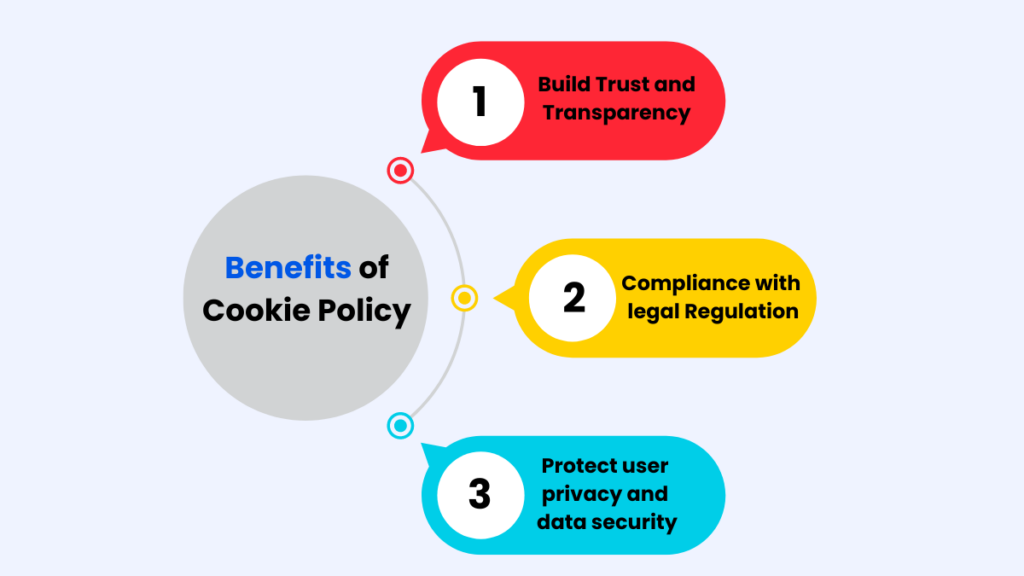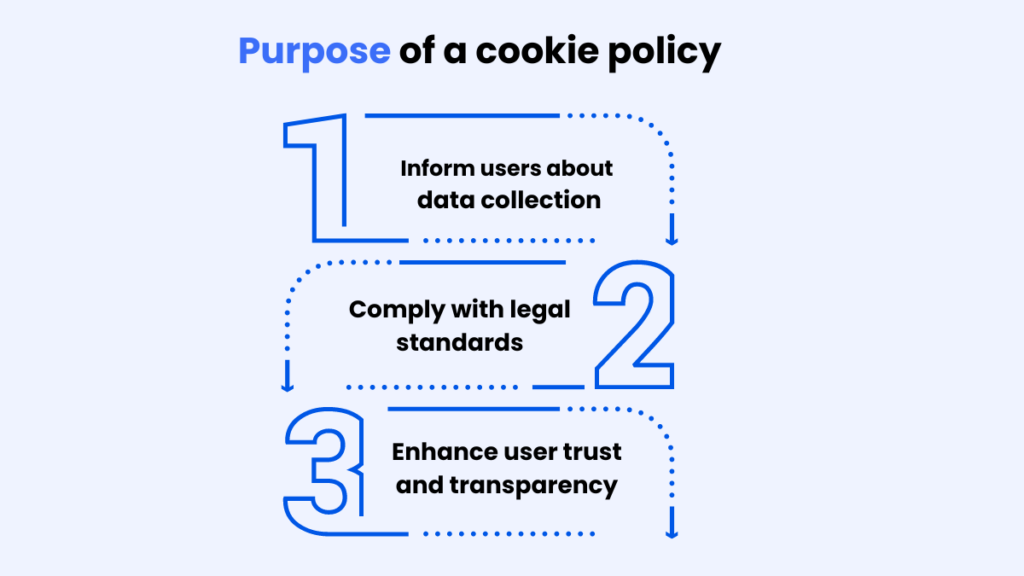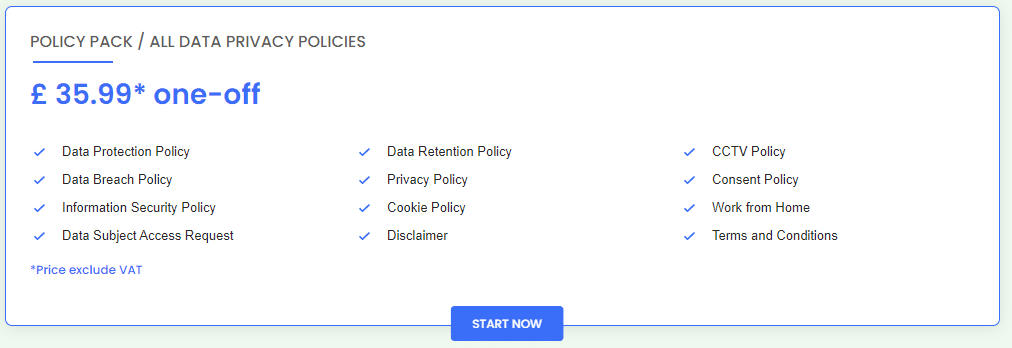There is much more to learn about cookie policy. This article will provide clarity regarding cookies, the laws and policies.
Read the entire excerpt and do not forget to comply with the requirements.
What is a cookie Policy?
A cookie policy is a policy regarding active cookies on your website. It sets out information about the user’s data being tracked, its purpose, and where it is being transferred/sent. Cookie policies must also contain information for opting out. Your service allows users to opt-out or change cookie settings if they have changed their minds.
Moreover, you are legally obligated to have a cookie policy as a website owner. Many site owners incorporate their cookie policy into the privacy policy section. But you are allowed to publish it in a separate section.
However, a privacy policy is an important document that occupies merely a page on the website. It outlines all the purposes and methods for the website’s data processing activities.
total control of your legal policies and compliance
obligations under GDPR.
Difference between privacy Policy and cookie policy
The table demonstrates the difference between cookie policy and privacy policy
| Privacy Policy | Cookie Policy |
| Details how a website collects, uses, stores, and protects personal data. It includes information about data rights, retention, and sharing with third parties | The cookie policy specifically addresses the use of cookies on a website. It explains what cookies are used, their purpose, how they affect users, and how users can manage their cookie preferences. |
| Privacy policy includes details on data collection practices, user rights, data protection measures, and compliance with laws such as GDPR or CCPA. | Cookie policy includes information on the types of cookies used, their functions, and how users can control or disable them. |
Why are Cookie Policies Important?
Cookie policies are essential for transparency and trust. They help users understand how their information is used, building trust in the website. Additionally, they ensure websites follow data protection laws to safeguard users’ privacy.

Do I Need a Cookie Policy for Legal Compliance?
In many parts of the world, including the European Union and California, some laws including the European Union’s General Data Protection Regulation (GDPR) and the California Consumer Privacy Act (CCPA)/California Privacy Rights Act (CPRA).require websites to be upfront about how they use cookies and to get your permission before storing them on your device. Websites have to follow these laws to avoid hefty fines and legal trouble.
GDPR (General Data Protection Regulation)
- Applicability: If your website is accessible to European Union (EU) users, you are required by the GDPR to have a cookie policy.
- Requirements: Websites mandate transparency and user control over data, including cookies. They must tell visitors what cookies your website uses, why you use them, and how people can manage their cookie settings.
CCPA (California Consumer Privacy Act)
- Applicability: If your website reaches Californians, you need to comply with the CCPA.
- Requirements: Websites must be clear about how they collect data, including cookies. Visitors must be informed about the types of cookies and their purposes, and they should be able to opt out of having their personal information sold. “Don’t Sell My Personal Information.”
ePrivacy Directive (EU Cookie Law)
- Applicability: This directive applies to all websites targeting users in the EU.
- Requirements: This Law emphasises clear and comprehensive information about cookie usage. Websites must obtain user consent before storing or accessing cookies on their devices.
Why Do Websites Use Cookie Policies?
Websites use tiny bits of information called cookies to remember things about your visit. They want to be transparent with you about how they collect information. These cookie policies let you know what kind of information they’re gathering and why. This is important because it gives you some control over your privacy to build user trust.
Purpose of Cookie Policy

Do I need a cookie policy on my website?
Most websites require a cookie policy to comply with the law. These policies clarify how the site utilises “cookies” to monitor your browsing activities. They emphasise transparency by disclosing what information is collected and its purpose.
This transparency helps establish trust and demonstrates a commitment to user privacy. Websites must inform users about the types and purposes of cookies and provide options for managing them. This ensures adherence to regulations such as GDPR and CCPA.
When Does Your Website Need a Cookie Policy?
Websites should have a cookie policy if they use cookies to track users’ actions, store their preferences, or collect statistics about site traffic. All websites that gather data through cookies should be able to provide a visible and clear cookie policy.
1. Analytics and Performance Tracking
Determine whether you employ tools like Google Analytics or Facebook Pixel.
2. Personalisation feature
Some sites may have a personalisation feature that remembers user preference settings (e.g., language) or log-in details.
3. Advertising and Marketing
Consider using cookies on your site for ad targeting or retargeting campaigns.
4. Third-Party Integrations
Consider Third-party Integration, such as embedded YouTube videos or social media plugins, that introduce cookies through their services on your site.
Cookie Policy Requirements
A comprehensive compliant cookie policy should include:
- A definition of cookies
- The types of cookies used
- The purpose of each type of cookie
- Information on how users can control or delete cookies
- Links to relevant privacy policies or third-party cookie policies
How to Properly Add a Cookie Policy to Your Website
To correctly add a cookie policy to your website:
- Create a dedicated page for your cookie policy.
- The link to the cookie policy is in the footer of your website and within your privacy policy.
- Use a cookie banner to notify users of the policy and obtain their consent before cookies are set.
Inform Users What Cookies Are
Clearly explain cookies, including a basic definition and typical uses. This helps users understand the technical aspects of cookies and their role in improving user experience.
Explanation:
- Simple, user-friendly definitions
- Common uses and benefits of cookies
Inform Users What Kind of Cookies You Use
You must inform your users about the specific cookies used on your website. Categorised the cookies based on their function and explain the purpose of each category.
Cookies Categorisation:
Some examples of the various types of cookies are
- Mandatory cookies
- Authentication Cookies
- Functionality cookies
- Consent Cookies
Getting User Consent for Your Cookies Policy
Obtaining user consent is crucial for legal compliance. Implement a cookie consent banner that appears when users first visit your site. This banner should briefly overview your cookie usage and a link to the full policy. Users should be able to accept or customise their cookie preferences.
Consent Methods:
- Cookie consent banners
- Options for accepting, rejecting, or customising cookies
Cookie Banner and Cookie Policy: What’s the Difference?
| Aspect | Cookie Banner | Cookie Policy |
| Purpose | Inform users about the use of cookies and obtain their consent | Provide detailed information about cookies used on the site |
| Visibility | Displayed prominently on the first visit to the website | Accessible via a link, usually in the footer or privacy section of the website |
| Content | A brief statement about cookie usage, with options to accept or manage | Comprehensive details on types of cookies, their purposes, and how to manage them |
| User Action | Requires immediate action from the user (accept, reject, or manage) | No immediate action is needed; it serves as a reference document |
| Timing | Shown immediately upon entering the site for the first time | Available at all times, usually linked within the cookie banner or site footer |
| Legal Compliance | Assists in meeting legal obligations for securing user consent. | Ensures compliance by providing detailed legal information and user rights |
| Detail Level | High-level overview | In-depth explanation |
| Updates | Less frequently updated unless the consent mechanism changes | Regularly updated to reflect changes in cookie practices |
Cookie Policy Examples
Examining examples of cookie policies from reputable websites can provide valuable insights into how to structure your policy effectively. Below are detailed breakdowns of cookie policies from major companies, highlighting key elements and best practices.
Google’s Cookie Policy
Google’s cookie policy is easy to understand and navigate. It explains why they use cookies clearly and simply. They focus on how cookies benefit you, like making the website work better and giving you a smoother browsing experience.
Google categorises cookies into preferences, security, process, advertising, session state, and analytics, explaining each type in detail. It provides instructions on how users can manage cookies through their browser settings, empowering users to take control of their data.
Additionally, specific examples of cookies and their purposes are listed, enhancing transparency. By breaking down cookies into particular categories, Google makes it easy for users to understand their different functions.
Facebook’s Cookie Policy
Facebook’s cookie policy is detailed, covers various aspects of cookies’ usage, and aligns with its extensive data collection practices. The policy begins with a basic explanation of cookies and similar technologies.
It then explains the purposes of cookies on Facebook, including security, functionality, and advertising. Information about third-party cookies used on Facebook is included, clarifying how they contribute to the user experience.
Users are informed about their control options, including browser settings and in-app controls. Facebook builds trust and clarifies the broader data collection ecosystem by including details about third-party cookies. Explaining the specific reasons for cookies helps users understand their value and necessity.
Amazon’s Cookie Policy
Amazon’s cookie policy is straightforward and concise, focusing on user comprehension and ease of access. The policy provides a brief introduction to the importance of cookies. This is a list of cookies: essentials, performance, and advertising. Each type is detailed distinctly.
Amazon guides users on taking charge of their data through their account settings and browser preferences for the different types of cookies. Third-party cookies (for advertising and analytics) are also accounted for, painting a comprehensive image of all cookie entities.
Amazon’s policy uses simple language, making it easy for people from different educational backgrounds to understand. It also informs users that the policies are manageable.
Creating Your Cookie Policy: Incorporating Best Practices
To create an effective cookie policy, consider incorporating the following best practices observed from these examples:
- Start with a Clear Introduction:
- Explain the purpose of the cookie policy and why cookies are used.
- Emphasise the importance of user experience and website functionality.
- Categories Cookies:
- Divide cookies into essential, performance, functionality, and advertising categories.
- Provide detailed explanations for each category.
- Provide Specific Examples:
- List specific cookies used on your website and their purposes.
- Enhance transparency by giving users concrete examples.
- Explain User Control:
- Offer clear instructions on how users can manage and delete cookies.
- Include information on browser settings and any in-app controls.
- Address Third-Party Cookies:
- Inform users about the presence of third-party cookies.
- Explain how these cookies contribute to the user experience and data collection.
- Use Simple Language:
- Write your policy in user-friendly language to ensure accessibility.
- Avoid technical jargon that may confuse users.
- Keep It Updated:
- Regularly update your cookie policy to reflect changes in cookie usage or legal requirements.
- Notify users of significant updates and provide opportunities for review.
Website cookie policy template
Here’s a template that incorporates these best practices:
Cookie Policy
Introduction Welcome to [Your Website]. This Cookie Policy explains how we use cookies to enhance your experience on our site.
What Are Cookies?
Cookies are small text or elements that appear when a person visits a website. These cookies enhance websites by improving their performance, complying with privacy laws, facilitating user interaction, and providing personalised content.
Types of Cookies We Use:
- Essential Cookies: These Cookies are necessary for website functionality.
- Performance Cookies: These Cookies help us understand how you use our site.
- Functionality Cookies: These Cookies remember your preferences and settings.
- Advertising Cookies: Such Cookies deliver relevant ads and track ad performance.
- Third-Party Cookies: These cookies are used by third parties for analytics and advertising.
Examples of Cookies:
- Session Cookies:
Sessional Cookies are temporary cookies that expire when you close your browser. - Persistent Cookies:
Persistent Cookies remain on your device until they expire or you delete them.
Managing Cookies: You can manage cookies through your browser settings. Here are some helpful links:
- [Browser 1 Settings Link]
- [Browser 2 Settings Link]
- [Browser 3 Settings Link]
Third-Party Cookies: We use third-party cookies for analytics and advertising purposes. For more information, please visit our partners’ third-party cookie policies.
Updates to This Policy: We may occasionally update this Cookie Policy. We will notify you of any changes by posting the new policy on this page.Contact Us: If you have questions about our Cookie Policy, please contact us at [Contact Information].
Seers–Be Compliant
If you browse online, you will get ample cookie consent plugins, which you would like to get. But make sure you choose the best one.
Seers can be your compliant partner. Our cookie consent WordPress plugin will help you comply with GDPR and ePrivacy regulations.
- Seers cookie consent has three parts.
- Cookie Audit or Scan
- Cookie Policy
- Cookie Banner

Cookie Audit: Use Cookie Audit to discover what Cookies your website is running and what you need to do to become compliant quickly.
Cookie Policy: Create a legally fully compliant Cookie Policies
So, Your Cookie Policies include our unique “automatically updating” Cookie Table, updated via HTML script you simply place on your site. This keeps you compliant at all times.
Is Cookie Consent Mandatory?
Websites usually have to get your permission before they can store or access cookies on your device. This applies to most cookies, except those that are strictly necessary for the website to function properly.
Seers Cookie Consent Banner provides explicit prior consent, periodic website scans to update cookie policy, coverage of different jurisdictions for different users, and auto-generate cookie policies and regular updates. Also, Seers is the ultimate solution, and through its WP Cookie consent plugin, you can make your business secure and reliable.
